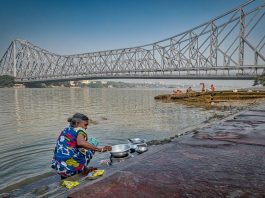In the tapestry of family journeys, there exists a unique thread that weaves together exploration and empathy, curiosity and understanding. “” invites readers to embark on a profound voyage, where the world’s disparities become vivid lessons and the landscapes of hardship are seen through the unfiltered lens of youth. As families traverse diverse communities, they encounter more than just new sights and sounds; they delve into the stories etched into the fabric of society. This article delves into the transformative power of these experiences, revealing how young travelers, with their boundless curiosity and innate sense of justice, can illuminate the complexities of poverty and inspire a deeper, collective reflection on our shared humanity. Join us as we explore how these journeys foster awareness, compassion, and a lifelong commitment to change.
Understanding Poverty: A Childs Perspective
In the eyes of a child, the world is an intricate tapestry of stories and colors. When families embark on journeys to understand poverty, these trips become more than just educational experiences; they transform into powerful narratives seen through young, unfiltered perspectives. Children, with their innate curiosity, often ask the questions adults might hesitate to voice. They notice the small details—the worn-out shoes, the hopeful smiles, and the quiet resilience in the faces they meet. This fresh viewpoint can lead to profound insights, reshaping how we perceive socioeconomic disparities.
- Empathy: Kids naturally empathize, often forming connections that transcend barriers of language and culture.
- Simplicity: Their understanding is direct; they see the essence of issues without the complications adults might add.
- Immediacy: Children live in the moment, offering a perspective that focuses on the here and now, prompting immediate reflection and action.
As families explore poverty together, the child’s perspective becomes a guiding light, illuminating the complexities of human experiences and inspiring a collective journey towards compassion and understanding.
 Family Travel Influencers”>Cultural Immersion: Lessons from Local Communities“>
Family Travel Influencers”>Cultural Immersion: Lessons from Local Communities“>
Cultural Immersion: Lessons from Local Communities
Engaging with local communities offers a profound insight into diverse lifestyles and values. Experiencing poverty through the lens of a family trip can be transformative, especially for young minds. Such experiences can break down preconceived notions and foster a deeper understanding of economic disparity. Children often perceive the world with an unfiltered lens, and their observations can lead to meaningful conversations about empathy, resilience, and gratitude.
- Open Dialogues: Encourage children to ask questions and express their feelings. This helps them process their experiences and learn to articulate complex emotions.
- Active Participation: Engage in community activities that offer hands-on experiences, like volunteering at local shelters or participating in cultural exchanges.
- Story Sharing: Listen to stories from community members to gain perspective and appreciate the strength and resourcefulness of those living in challenging circumstances.
By embracing these lessons, families can cultivate a sense of global citizenship, where understanding and compassion transcend economic boundaries.

Engaging Young Minds: Activities to Foster Empathy
Immersing children in environments that differ from their own is a profound way to nurture empathy and understanding. During family trips, consider integrating experiences that allow young minds to observe and reflect on the realities of poverty. Such experiences can be eye-opening and transformative, helping children develop a deeper appreciation for the privileges they might take for granted.
- Visit Local Shelters or Food Banks: Many organizations offer tours or volunteer opportunities that can be educational. These visits provide children with a firsthand look at the challenges faced by those living in poverty.
- Explore Cultural Exhibits: Museums and cultural centers often host exhibits that focus on social issues, including poverty. These exhibits can offer historical context and stories that resonate with young visitors.
- Participate in Community Clean-Ups: Engaging in local community service projects can show children the importance of contributing to society and how small actions can make a significant impact.
By incorporating these activities into family trips, parents can create meaningful learning experiences that go beyond the traditional vacation. Such encounters encourage children to ask questions, seek understanding, and foster a sense of compassion that will stay with them as they grow.

Practical Tips for Family Travel with a Purpose
Embarking on a journey with your family to explore the realities of poverty can be both enlightening and impactful. Here are some practical tips to ensure your trip is meaningful and considerate:
- Engage with Local Communities: Before visiting, research and connect with local organizations that focus on poverty alleviation. Volunteering or participating in community activities can provide invaluable insights and foster genuine connections.
- Educate Through Storytelling: Use age-appropriate books and documentaries to prepare your children for what they might encounter. Stories can serve as powerful tools to evoke empathy and understanding.
- Encourage Reflection: After each day, have a family discussion about the experiences. This reflection can help young ones process their thoughts and emotions, deepening their understanding of complex social issues.
- Practice Responsible Giving: Instead of handing out money or goods directly, support local businesses and initiatives that aim to create sustainable change. This encourages economic growth and respects local dignity.
By approaching your trip with mindfulness and purpose, you not only broaden your family’s perspective but also contribute positively to the communities you visit.




